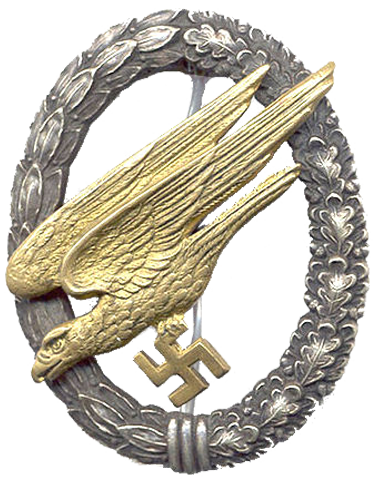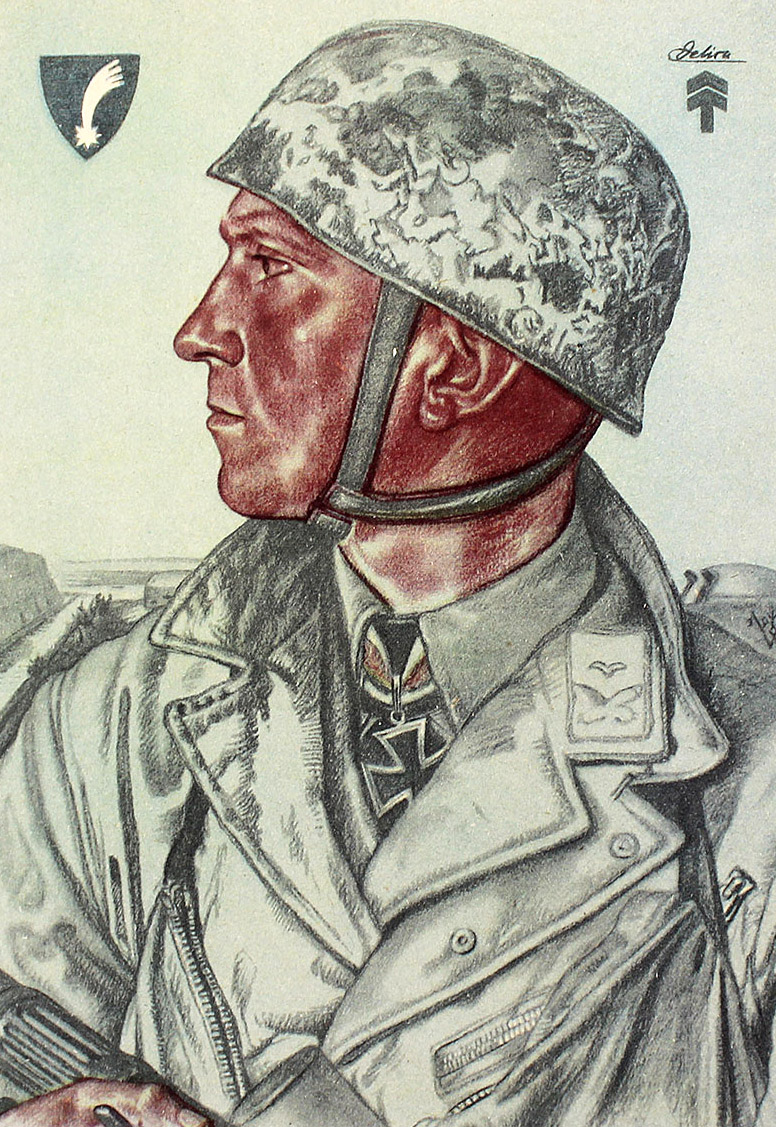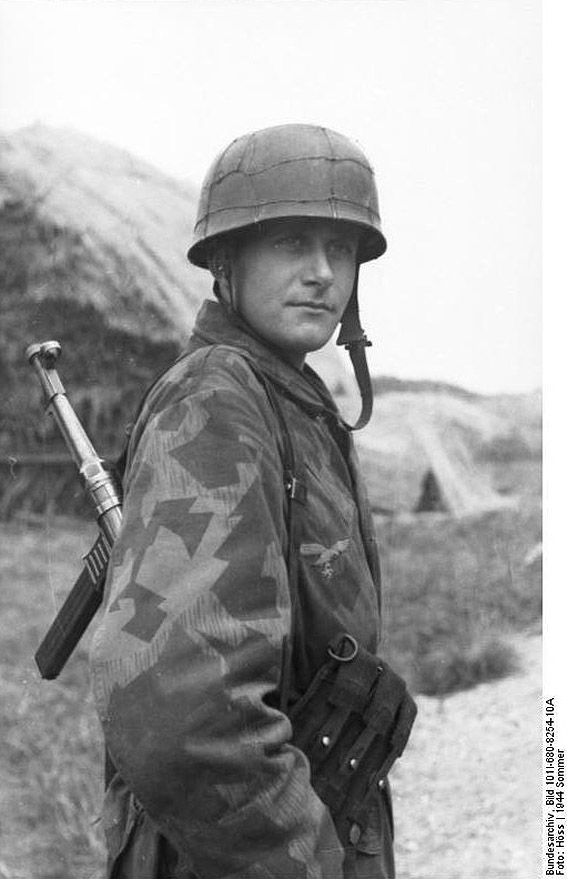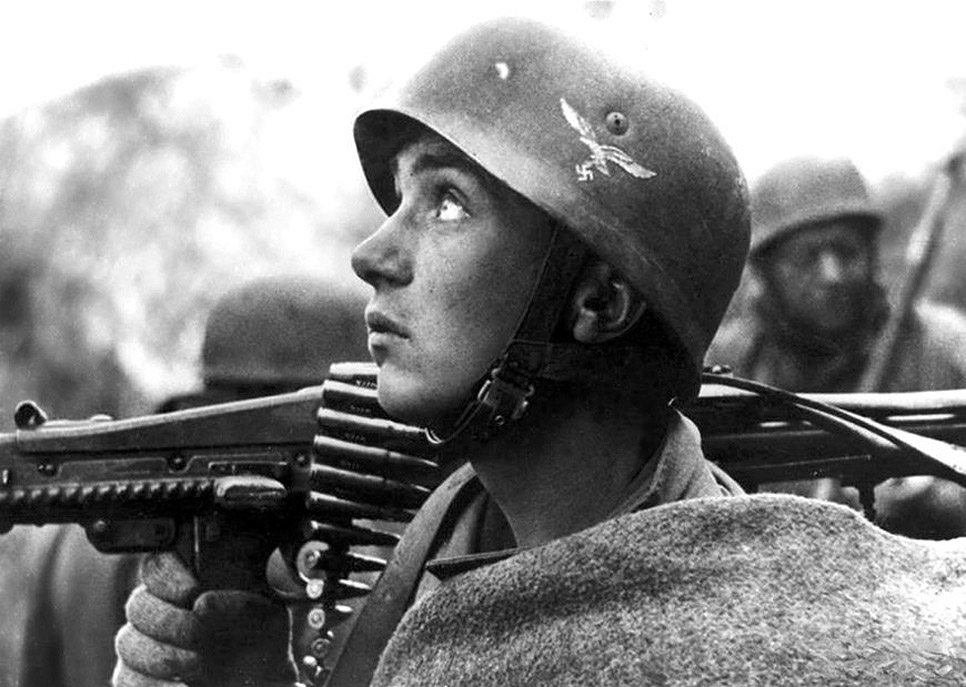Gunter: I remember the area very well, it was some of the most beautiful countryside in Europe. Of course we did not help its look by placing our guns and bunkers there, but that was the necessity of war. There were many farms I remember, with lots of animals, at times it kept us from sleeping after pulling nighttime guard duty.
I remember the area being very busy when we arrived, as the Todt Organization [Organization Todt was a massive civil and military engineering organization run by Albert Speer] and workers from all over Europe were hired to build the bunkers and placements. They even put us to work to lay [barbed] wire in our area. Our leaders figured there would be an airborne drop behind the lines.
They had fields flooded, and wire put down in some likely landing places. Our problem was there were hundreds of kilometers to cover and we only had a few thousand meters of wire. The farmers were not happy with us, I can tell you that. One day we were laying wire in a field and the farmer and his daughter came out to yell at our NCO [non-commissioned officer].
We stopped working to listen, and he kept going on about how his cows could get snared on the wire. We raised it up high so they could go under it to make him happy. It was designed to catch a soldier about [6ft] off the ground, and make it hard to get loose. With all this work we did, it was somewhat successful, we caught quite a few in these traps the first night.
As for the French I can say we had good relations with them. We had very strict orders to treat them with the utmost respect. We could not take without asking, and had to pay their price for any goods we wished for. The women were off limits in principle, but that did not stop a few romances from blossoming that winter and spring.
Something I will tell you that is misrepresented today is that we did not get to occupy French homes. We had our own barracks or camps we stayed in. It was forbidden to enter into any residence without being asked first. The reason for this was to not give the French any more reasons to help the Allies or resistance.
We set boundaries and stuck to them as best we could. When the invasion started then some of that changed out of military necessity. The Americans would occupy homes, farms, and villages where they fired on us. We had to then attack to drive them out which meant occupying areas we were technically not allowed to be in.
Something else on my mind about the French, they came to us for help during the invasion. The Allies were bombing and shelling their towns for no reason and caused many wounded. German forces treated these wounded as best we could. Many French thanked us for the fair treatment and spoke well of us after the war. The Allies have told stories about war crimes in Normandy, shooting civilians and wounded. I can tell you this did not happen on our side.
Can I ask what you remember of the fortifications in Normandy, were there a lot of them?
Gunter: Heavens no, even Rommel commented an entire army could walk through them. The Atlantic Wall was a myth. Both the Allies and Goebbels loved the name. Goebbels more spoke of it to bolster the morale of the people, and in some areas it was indeed formidable. The Allies loved it because they made it sound like they were up against an evil empire with unlimited walls and resources that they defeated.
The truth is that the fortifications in Normandy were sparse, and spread out too far to make a big impact on the invasion. Our leader Heydte [Friedrich von der Heydte was a German paratrooper officer] told us the same things, he thought the whole area was prime landing area and was not well defended. Some people fail to appreciate just how large an area Normandy is.
There were artillery emplacements in bunkers, but only one gun, and maybe a platoon to defend it. The bigger batteries were placed very far apart where if communications were cut they could not help each other. These were mostly taken in the first hours of the landings.
There were small machine gun bunkers who wreacked havoc on the Americans, but this was a rare stand. I have read reports where others came ashore like on a holiday. Most all German units were placed well behind the beaches, thinking they could be rushed up to contain any landings. The Allies play up the little resistance there was those first hours, as if they were outnumbered.
The Allies bombed the whole area for a month straight before the invasion, and the day before we got an awful pounding. Most of the heavy guns were knocked out right before or the day of the invasion. All that hard work was a waste of time as it was too little to put up a stiff resistance. For the most part the Allied forces moved inland [five miles] in the first day which threw our plans out the door.
Rommel knew the best place to land was Normandy, and I am told Hitler agreed with him but was dissuaded by other generals from placing armor closer. I remember our situation was so funny to me that we had a Panzer regiment close by, it was all old French tanks supported by Russians who spoke little German.
That might baffle you to hear, but we had many eastern soldiers there in Normandy and they mostly were killed in the first few days. The German army by now was so short-staffed that they allowed many from the east to serve. There were many I remember, they had German officers mostly, and we would see them drill sometimes.
They manned a lot of the beach fortifications by us, or flak positions. One unit shot down a four-engine bomber in the daytime. We were outside and could see the smoke trail off in the distance. Word spread that night that an east unit shot down its first bomber. I trust this answers your question about the fortifications in Normandy. In short there were some, but not nearly enough and what was there was quickly overrun by the numerically superior forces of the Allies.
Gunter: I remember it through the lens of a youthful soldier. Of course we were all on unofficial alert for the last week, the air activity was a giveaway. Our officers said the weather was bad, but to not be lulled to sleep. We slept very lightly. I remember that on the morning of the 6th, after midnight, we heard distant firing.
Our comrades, who were on duty, came to wake us saying something was afoot. We dressed and made sure we were ready for the alarms. Our officers knew something was happening right after midnight. We saw the sky come to life with flak fire, but it was sporadic. There were not a lot of these either so very few planes were hit.
We started to get reports that the enemy was landing behind the beaches and that we should go out to start hunting them. This was hard at night, but it had to be done. We were hearing firefights in the distance and plane engines, this went on for awhile. We went out into the unknown to see what was happening.
The French were coming to us saying the Americans had landed aircraft and soldiers behind us. One French farmer brought in an American soldier with his shotgun; the soldier was young and looked disoriented. He was sent to our leaders to be debriefed, but those who spoke English were asking him a million questions.
We came to one landing area which had fallen already. We saw our first dead enemy and we saw the results of some of our wire. Something I will tell you that was sad was that some Americans died by their own weapons. We found American soldiers who jumped in the night and landed in trees and shrubs. Some were found burned up from fire grenades getting snagged on branches and set off. This killed the soldiers as they could not get free of their equipment.
I looked at one we found and was amazed at the vast amount of equipment he carried, he had grenades everywhere. I was thinking they were walking time bombs if they dropped in a bush where anything could snag the pins and cause a detonation. One landed in a tree with a loaded rifle and was shot in the chin when it snagged on something and shot his own head off.
We didn't have too much time to look at these soldiers, as there was now fighting flaring up behind us and to the north. Many civilians were stirring and wanting to know what was happening. One brought a wounded child to our aid station, saying she was shot by an American when she surprised him. We heard she died later as the wound was too severe.
The real fighting came in the morning, it had to be close to 7am if I remember. The landings were starting and there was artillery coming from everywhere. The ships were firing to break the resistance nests. Many were put out of action at this time, but I would hear our guns fire occasionally.
Our orders were now to engage the enemy paratroopers so we began to mop up pockets of them. They were well supplied and we did enjoy it when we came across the rations they dropped. We had to be made to keep going once when we took a whole supply dump that they had dropped for their soldiers. There were hundreds of boxes of food, cigarettes, and medical supplies. Our officers yelled we had a job to do, and it wasn't to get fat off enemy rations.
Some areas were flooded, which actually favored the defense of the Americans. We set up perimeters around some hot areas and brought up mortars to shell them. We had some spirited fights that broke out, and we learned they were better armed than we were. We would shoot with one mortar, and then have a whole battery fire on us.
The skies belonged to the enemy we learned as well. We could barely move without drawing the fire from the Jabos roaming overhead. They did everything they could to give cover to the soldiers we had pinned down. They were reckless, however, they shot at everything, even Red Cross marked vehicles and civilians.
That whole first day was a whirlwind, the Allies seemed everywhere and the sounds were maddening. They seemed to have a million barrels pointed at us which made any movement hard. This allowed them to move into the many towns we did not occupy. One town I remember seeing them in was Angoville [Normandy region in northwestern France], which was [5 miles] from the coast and in our area.
The Americans were in the town, and I remember we had to attack to drive them off which we did. I remember going to the church to make sure they were not in there. A comrade had already gone in and said there were wounded Americans who were being cared for by medics. Just then as I was going to see for myself the enemy started shelling us with mortars.
An attack was launched to drive them off, which succeeded so I went back to the church with some comrades, one of whom was wounded. We saw Americans inside but they made sure all weapons were left out of the church; we did the same thing and brought our comrade in for treatment by our medic. We also brought up some of the supplies we captured so the men had food.
It was ordered that this would be made an aid station for all soldiers and civilians and off limits to any military operations and weapons. We placed a Red Cross banner up and prepared to depart. I learned later many wounded civilians came here to be treated by German and American medics. It was one of those rare times when enemies worked together as friends.
We ended up being driven back after a few days. The beach invasion force had a lot of men and material which we could not match. The Panzer divisions had not moved into place yet, some took weeks to arrive due to air attacks. The Americans had a lot of armor and artillery and they let us know it.
From that first day of the invasion we were thrown onto the defensive, and had to try to hold and contain their attacks on our lines. This we did well, and we made them pay for each hedgerow they took, once the Panzers came it was a hard time for them to advance. I witnessed one Panzer knock out five American tanks in a row. That impressed me and I thought if we could all do this feat we might win. I was young and foolish and it did not occur to me that they could easily replace these losses, where we could not.
The fighting went on here for close to two months, and then our lines were finally breached with a large assault that broke our back in Normandy. It was a full-scale route.
We had to hold open an escape route around Falaise.
The German lines in Normandy were broken and we were forced to retreat all the way back to the borders of the Reich. This is where our leaders told us we would now stop the Allies and win the war, but no one believed that. We had seen the vast strength the enemy had and we knew we could not come close to matching it.
Did some people start to not believe in Hitler? I have read that Heydte was against Hitler?
Gunter: I think you must take that into the context where it belongs. After the war, when the fighting stopped, it was no longer prudent to say you supported Hitler. Many party men had to reverse course and agree with the assessments of the Allies. It was no longer in anyone's best interest to say anything good about Hitler and the Party.
I have spoken to Heydte only a few brief times, but I can share with you that what comrades speak about behind closed doors, is not the same as what was said to the Allies. Much of what was said was only to save one's family and property. The occupation government made you pay for any observed support of Hitler.
From what little I spoke to him about he was appalled at the way the war turned out for us. The deaths after the war due to Allied indifference and their vengeance concerned him. He never blamed Hitler for this, but was critical of some of the war decisions. He believed we could have won if different decisions were made.
Now I must tell you that of course there were those who opposed Hitler, he was a revolutionary leader and not everyone agreed with his ideas. Some people who supported him in the beginning lost faith when they saw he would not bring back the monarchy, or thought he was too heavy handed with the Jews.
My theory on this is that even Hitler wasn't prepared for just how deep Jewish power was. I think he was na´ve, in that he thought he would drive them out of power in Germany and that would be it. The problem was he missed the big ones, and then fell into their trap.
They had the goal to make Germany pay for Hitler, and they used his own goals against him. They knew he wanted a return of the lost lands and instead of allowing peaceful settlements they were able to drag us into war and it quickly got out of hand. I know we did not wish to fight America, and Britain was not our enemy either.
I remember seeing the pamphlets the Allies dropped on Germany, telling us the only way to end the war was to make our leaders stop fighting. They encouraged sabotage, resistance, and told fanciful stories of people resisting already. I knew these were not true and was only their propaganda, but a few Germans did take this to heart. Many former communists were part of the resistance, because they wanted a red Germany. Today they are all painted as heroes; imagine a country treating cowards and traitors as its heroes. They had no honor in life, and now have false honor in death.





